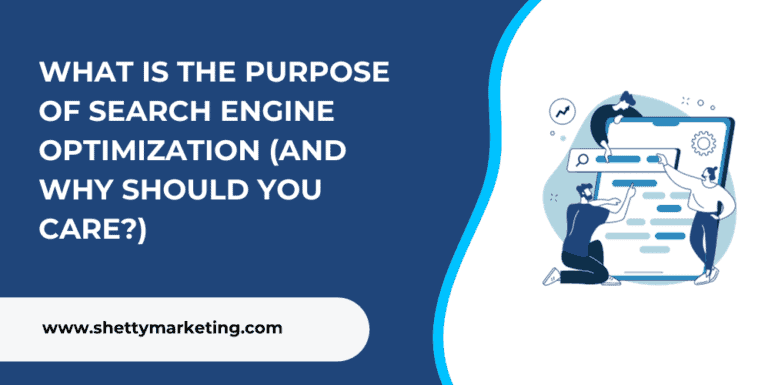The purpose of search engine optimization (SEO) is to assist customers in finding information or products that are relevant to your industry. By optimizing your website and content, you can improve your visibility and ranking on search engine results pages such as Google and Bing, making it easier for potential customers to discover your business.
Social media platforms can definitely be helpful for engaging with customers and promoting your brand.
However, when it comes to benefiting your business, targeting customers with a higher intent to purchase the product can be even more advantageous. This can be done only through search engine optimization.
In the upcoming sections, I’ll explain more about SEO and how it can benefit your business.
Which business might find SEO useful?
Every business can benefit from SEO. But if you’re looking for some specific examples, then real estate, pet care, home repair/renovation, and e-commerce businesses can really reap the rewards of SEO.
Purpose of Search Engine Optimization in Real Estate Businesses
Real estate businesses can greatly benefit from SEO by making sure their website is the first point of contact for potential buyers and sellers.
When people start searching for a new home or property, they usually use search engines like Google. They type in specific search queries, like the type of property they’re interested in and the location they prefer.
SEO strategies help real estate websites rank higher in search engine results when these searches happen.
By optimizing their website with relevant content, keyword research tools, and quality links, real estate businesses can increase their visibility and attract potential customers.
By ranking for search terms relevant to their market, such as “mortgage calculator” or “online home evaluator,” they can convert those visitors to leads using lead magnets.
Related: How are leads generated (Leverage the power of lead magnets)
This makes SEO an essential part of any real estate marketing efforts, helping businesses connect with potential customers.
How SEO benefits pet care businesses
If you are offering pet grooming services or selling pet care products through an e-commerce store, implementing SEO strategies can significantly benefit your business.
For pet grooming and related services, SEO helps increase your online visibility and reach potential customers. By optimizing your website with relevant keywords and creating high-quality content, you can appear higher in search engine rankings.
This means that when pet owners search for services like pet grooming or pet care in their area, your website is more likely to show up. This not only increases your organic traffic but also attracts more potential customers to your business.
Similarly, e-commerce stores selling pet care products can leverage SEO to increase their organic search rankings. By conducting keyword research and optimizing product descriptions with relevant keywords, you can attract more visitors and potential customers to your online store.
For local pet care shops, local SEO is particularly beneficial. By optimizing the website with location-specific keywords and ensuring consistent business information across online directories, you can improve your visibility in local search rankings. This helps pet owners in your area find your shop easily when they are looking for nearby pet care services.
Purpose of Search Engine Optimization in home repair and renovation
With the increasing demand for home repair services in many commercial cities, it is crucial for businesses in home repair to rank high in search engine results.
SEO allows these businesses to optimize their websites, making them more accessible to search engine crawlers and improving their chances of appearing in relevant search queries.
One of the key advantages of implementing SEO for home repair businesses is the ability to tap into the immense search volume associated with emergency services.
When homeowners are faced with urgent repairs or renovations, they often turn to search engines to find immediate assistance. By having a strong online presence, businesses can ensure that their services are easily discoverable by potential customers during these crucial moments.
How SEO Benefits e-commerce Businesses
Ranking for long-tail keywords within a specific niche is particularly important for e-commerce businesses. These longer and more specific search terms are often used by users who are closer to making a purchase decision. By targeting these keywords, businesses can attract highly relevant traffic to their site.
To find these long-tail keywords, SEO professionals use keyword research tools such as Keyword Everywhere, Mango Tools, and others. These tools provide valuable insights into the search volume and competition for different keywords, allowing businesses to strategize their SEO efforts accordingly.
One popular technique to find long-tail keywords is the KGR (Keyword Golden Ratio) technique, which identifies low-competition keywords with high search volume.
Optimizing product pages is another crucial aspect of SEO for e-commerce businesses. Each product page should have relevant and high-quality content, optimized title tags, appropriate internal and external links, and a user-friendly layout. Additionally, ranking for listicle blogs can be beneficial as they attract users who are seeking recommendations and comparisons.
In conclusion, the purpose of SEO for e-commerce businesses is to increase visibility, drive organic traffic, and ultimately convert potential customers. By targeting long-tail keywords, optimizing product pages, and ranking for listicle blogs, businesses can effectively improve their search engine rankings and attract a relevant audience, resulting in increased sales and success.
How much does SEO cost for a business?
When it comes to the cost of SEO, there is no one-size-fits-all answer. The price can vary depending on several factors, including the size of the website, the level of competition in the industry, and the scope of SEO services required.
On average, businesses in the USA can expect to spend between $500 and $2,500 per month on SEO.
However, it’s important to note that local SEO and national SEO may have different price ranges.
Local SEO concentrates on optimizing a business’s online presence for local searches. This can help brick-and-mortar businesses attract customers in their local area. The average cost of local SEO can range from $300 to $2,000 per month, depending on the specific requirements and goals.
On the other hand, national SEO focuses on optimizing a website for broader, national search terms. This type of SEO targets a larger audience and usually comes with a higher price tag. The average cost of national SEO can vary from $2,500 to $10,000 per month.
Investing in SEO is essential for businesses looking to increase visibility, drive organic search traffic, and ultimately grow their customer base. While the cost may vary, the long-term benefits of effective SEO strategies make it a worthwhile investment for any business.
Related: How much does it cost to build a website for a small business
What is most important in Search Engine Optimization
When it comes to search engine optimization (SEO), there are several important factors to consider.
However, the most important aspect is establishing expertise, experience, authority, and trustworthiness, which can be achieved by obtaining authoritative links from reputable websites.
Another crucial aspect of SEO is technical SEO. This becomes particularly significant for larger websites with high traffic volumes.
Technical SEO involves optimizing the technical aspects of your website, such as site speed, mobile responsiveness, and crawl ability, to enhance its performance and visibility in search engine rankings.
By prioritizing technical SEO, you can ensure that your website is accessible, user-friendly, and optimized for search engines.
But, the top priority in SEO should be On-page SEO. This involves optimizing various elements on your website, such as meta tags, headings, and content, to ensure that search engines can easily understand and index your site. I personally suggest Rankmath for that.
Which is the more effective source of organic traffic? Social media or SEO?
When it comes to driving organic traffic, there’s no doubt that SEO is the ultimate game-changer.
While platforms like Twitter, Pinterest, and Instagram also offer organic reach, the chances of standing out are only about 3 out of 10, as the visibility depends on the quality of the post.
However, with SEO, you have the power to gain visibility by focusing on long-tail keywords alone. The catch is that sometimes, the quality of the content takes a backseat in the pursuit of SEO optimization. Most SEO analysts are familiar with this trade-off.
So, if you’re looking to tap into the vast potential of organic traffic, SEO is definitely the way to go!





